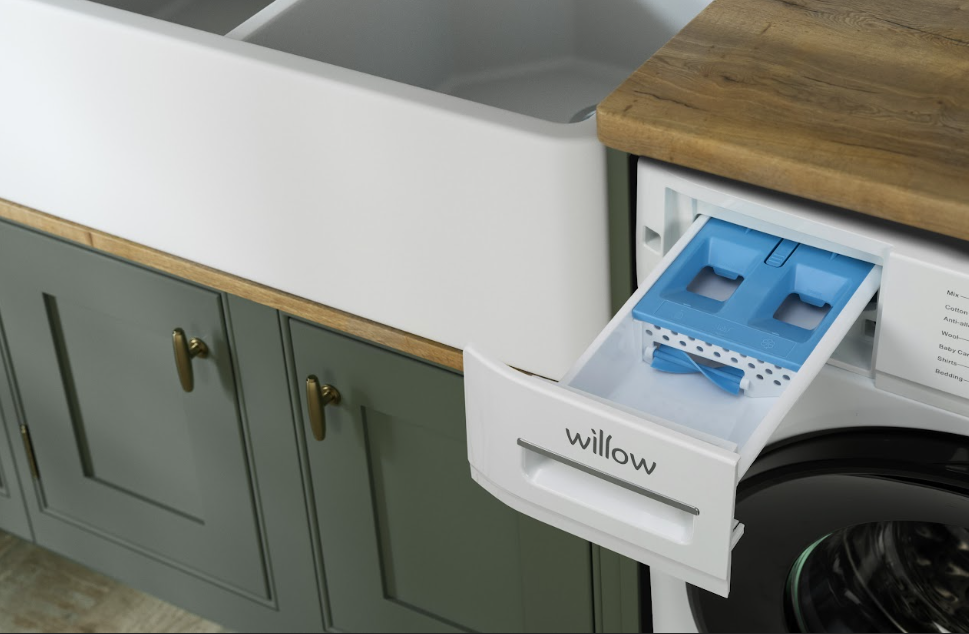Why does my washing machine smell?
Washing machines in our homes are a staple appliance used week in, week out, and on average most households in the UK wash an average of 260 5kg loads per year, and with this in mind, it is no surprise sometimes you'll wonder; ‘Why does my washing machine smell?’
In this article, we’ll delve into the reasons behind washing machine smells, effective methods to eliminate the odour, preventive measures, and tell-tale signs it might be time for a replacement.
What causes a washing machine to smell?
Nobody likes to find their washing machine smelling anything less than fresh, but there are a number of factors that can cause a foul smell.
They include:
Mould and mildew
In the UK, we’re no strangers to mould and mildew, particularly in winter, but did you know your washing machine is also at risk of mould growth?
The rubber gasket around the door of your washing machine and the detergent dispenser are hot spots for bacteria to thrive. These unwanted fungi can thrive in moist environments, resulting in a musty and unpleasant odour.
Clogged drain
If your washing machine drain is clogged or partially blocked, it can lead to water building up, creating the perfect environment for bacteria and mould to grow. This will not only make your washing machine less efficient, but it will likely result in a foul smell.
Detergent residue
Over time, you may find that your detergent and other dirt can build up in hidden areas of your washing machine, creating a breeding ground for bacteria. Again this can result in an unpleasant smell developing. You may also find that using a poor-quality detergent or even too much can contribute to residue accumulating in your machine.
Cleaning
Like any household appliance, washing machines need regular cleaning and maintenance to prevent odours. If dirt and residue are allowed to build up, you'll notice unpleasant smells start to emanate from the machine over time.
How to get rid of the smell from your washing machine?
Now that we've established the key causes of bad smells from your washing machine, let's explore some of the most effective methods to eliminate these smells.
One of the most popular home remedies for cleaning a number of appliances is to run a hot water cycle with vinegar. Distilled white vinegar is a natural disinfectant that will help to break down any detergent residue and kill bacteria.
Using a cup of vinegar and a hot cycle, your washing machine should be left smelling clean and fresh.
Another tip is to regularly wipe down the rubber gasket and detergent dispenser with a mixture of water and a mild detergent.
Often, the best way to reach all the small crevices is to use an old toothbrush to ensure you remove all the hidden mould and mildew.
Baking soda is another excellent home remedy for neutralising odours. Simply add a cup of baking soda to an empty cycle and run a hot wash to eliminate unpleasant smells.
One of the most neglected parts of a washing machine is the drain filter located at the bottom of the machine. This filter quickly accumulates debris from each cycle and can contribute to the bad smells.
Regularly cleaning this filter will not only help your washing machine stay in optimal condition but also prevent odours.
How to prevent your washing machine from getting smelly
You can adopt several preventative measures to ensure you never come home to a bad-smelling washing machine again.
Leave the door ajar
In between cycles, you should always leave your washing machine door slightly ajar, allowing air to circulate and preventing the growth of mould and mildew.
Regular cleaning
One of the best ways to prevent odours is to make cleaning your washing machine a routine task. This should include wiping down the interior, the rubber gasket and the detergent dispenser regularly, as well as running hot cycles with white vinegar or baking soda.
High-quality detergent
Unfortunately, not all detergents are created equally, which is why we would always advise investing in high-quality detergents and following the recommended dosage to avoid excessive build-up.
Check pockets
We're all guilty of leaving anything from tissues to receipts in our pockets before chucking them in the washing machine. However, to prevent odours, it is important to check for items tucked into clothing before putting them in the machine. Items such as paper tend to disintegrate during the wash and can lead to foul smells.
How to tell when you need a new washing machine
Regular cleaning, care, and maintenance are the keys to extending the lifespan of your washing machine. However, inevitably, there will be a time when you require a replacement.
Here, we’ve detailed some of the signs that indicate it might be time to invest in a new appliance:
Constant odours
If you've tried all the cleaning methods listed above to tackle unpleasant smells and they're still persisting, it could be a sign of a more serious issue with your machine.
Loud noises
During the wash cycle, if you notice loud or unusual noises, your machine may have a mechanical problem. In some cases, investing in a new washing machine is more cost-effective.
Breakdowns
If you find yourself regularly calling engineers to carry out repairs on your washing machine, it might be time to consider replacing your appliance before the costs start to add up.
Poor cleaning
If, after carrying out a deep clean of your washing machine, you notice your clothes are still not coming out as clean as they used to, it might be a sign that your appliance is no longer functioning as it should.
Is it time to replace your washing machine?
If your washing machine starts to break down, does not smell great, and is generally not working as it once did, it might be time for an upgrade.
At Home Feeling, we supply premium-quality kitchen appliances to customers across the UK and have a range of washing machines suitable for every type of household.
If you have any questions or would like more information, don’t hesitate to contact our team today on support@homefeeling.co.uk or give us a call on 01543 228622.



